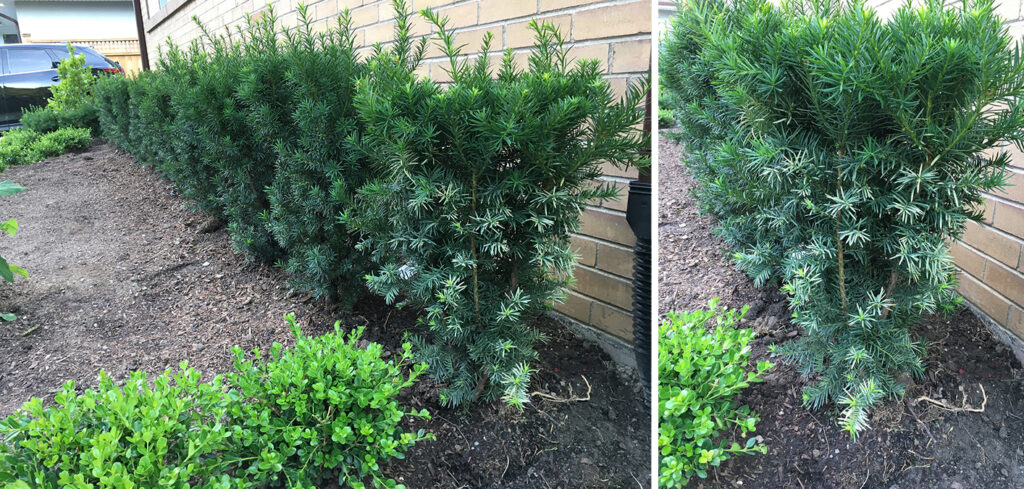
Recently we had some landscaping work down, including a new bed with shrubs and plants (yews, boxwoods, hydrangeas and a magnolia tree) that were planted at the front of our house (front is east facing). It will be one week tomorrow since they have been planted, and the last few days I noticed one of the yews that is about 3 ft. high has a slight discolouration (predominantly white, and a slight hint of yellow / brown). It is also planted near an eavestrough that is connected to a mole pipe that was trenched out and runs underneath the bed. For the first week I’ve been watering all shrubs and plants in the morning and night. I also used a water soluble fertilizer and applied to everything on the third day, and will do so again in 14 days. Starting with this morning I plan to just water in the morning, and assess the soil moisture to determine how much to water everything. I just wanted to check in and see if this is cause for concern in terms of the discolouration (see image with two views provided).
Thank you for contacting the Toronto Master Gardeners. My immediate thought is that you should be contacting your landscaper for this information. Since these trees are newly planted, they will be under warranty, and could be replaced.
Yews are typically very hardy plants, and are not susceptible to many diseases. However, several stress factors can cause yews to turn white or brown. From what you have written, there is a chance that you have over-watered; over-fertilized; or your yew is showing stress from the transplant experience.
Yews don’t like “wet feet” and can develop root problems if their roots are kept too wet. Although considered relatively drought-tolerant, too little water can also cause problems. So, making sure your soil is not getting water-logged. Water during very dry periods, like now, as well as in the winter. Provide transplanted evergreens with at least 1 inch of water per week during the first year. Water less frequently if you planted the tree in clay soil or more frequently if in sandy soil. Add a two-to-four-inch deep layer of mulch from the tree’s base to its outermost leaves making sure that the mulch is a few inches away from the trunk. Hold off on that second round of fertilizing until the plant looks stronger.
Your tree may also be suffering from transplant shock. One of the main reasons trees struggle after being planted or transplanted is because they lose a massive amount of their root system during the process making them more susceptible to pests, diseases, water stress and environmental problems. This makes it hard for the tree to bounce back once it is replanted in a new location. Giving the tree adequate water and mulch reduces the risk of stress and transplant shock.
Did you help while the landscaper was transplanting the tree? Was the hole the right size? It’s incredibly important for the planting hole to be 2 to 3 times larger than the tree’s root spread and deep enough for the root flare (where the tree starts to widen) to sit slightly above ground. With the molepipe in the way, was it possible to give the tree enough space when it was planted?
The last step in a successful transplant process is patience! Some trees take two or more years to get rid of all their stress symptoms. Occasionally, it can even take up to 5 years for trees to fully recover.
According to Rutgers Masster Gardeners of Mercer County:
“A tree is considered a transplant for at least 2 years and for as long as 10 years, depending on species and speed of recovery, no matter how old it is when planted. (One rule-of-thumb is that transplant recovery takes the diameter-of-the-tree-plus-one in years. For example, a three-inch caliper tree should take 4 years to recover from transplanting.) Even a tree that is drought tolerant or wet site tolerant when established will not have that tolerance for the first two to four years that it takes to redevelop a strong root system.”
If you would like to have a quick review of all that can go wrong with your Yews, consider this website. But please keep in mind, that Yews are hardy plants! https://www.missouribotanicalgarden.org/gardens-gardening/your-garden/help-for-the-home-gardener/advice-tips-resources/visual-guides/yew-problems.aspx

